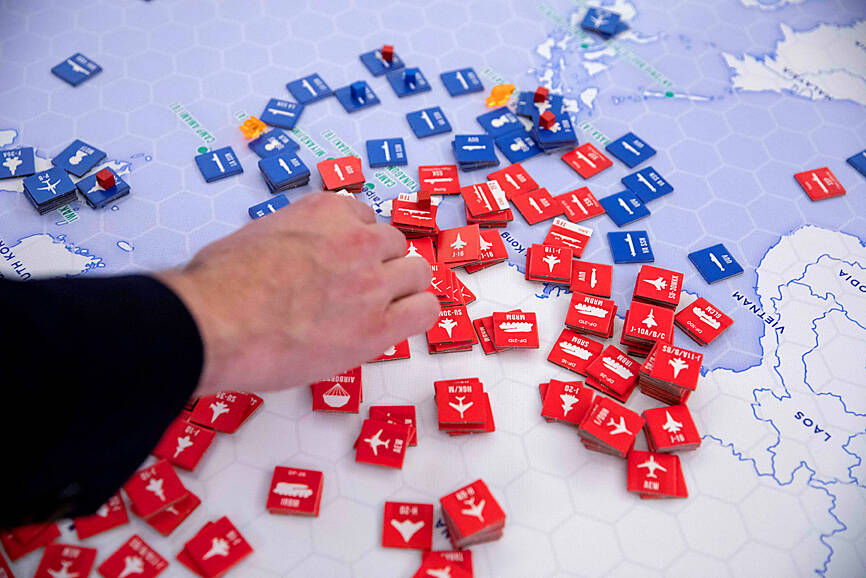The date is April 22, 2027, and 72 hours into a first-strike Chinese attack on Taiwan and a US military response. Already, the toll on all sides is staggering.
It was a war game, but one with a serious purpose and high-profile players: members of the US House of Representatives Select Committee on Strategic Competition Between the US and the Chinese Communist Party.
The conflict unfolded on tabletop maps and markers under a giant gold chandelier in the US House Ways and Means Committee room.

Photo: Reuters
The exercise explored US diplomatic, economic and military options if the US and China were to reach the brink of war over Taiwan.
Played out like a board game during one night last week, it was part of the committee’s in-depth review of US policies toward China as lawmakers, especially in the Republican-led US House of Representatives, focus on tensions with Chinese President Xi Jinping’s (習近平) government.
In the war game, Beijing’s missiles and rockets cascade down on Taiwan and on US forces as far away as Japan and Guam. Initial casualties include hundreds, possibly thousands, of US troops. Taiwan’s and China’s losses are even higher.
Discouragingly for Washington, alarmed and alienated allies in the war game left the US to fight almost entirely alone in support of Taiwan.
A US hotline call to Xi or one of his top generals, to calm matters, was not included in the role-playing scenario.
The war game was not about planning a war, but figuring out how to strengthen US deterrence, and to keep a war involving the US, China and Taiwan from ever starting, lawmakers said.
Ideally, members of the US Congress would walk out of the war game with two convictions, US Representative Mike Gallagher, the committee chairman, told colleagues at the outset.
“One is a sense of urgency,” he said.
The second is a sense “that there are meaningful things we can do in this Congress through legislative action to improve the prospect of peace and stability across the Taiwan Strait,” Gallagher said.
In reality, US Representative Raja Krishnamoorthi, the committee’s top Democrat, told lawmakers: “We cannot have a situation where we are faced with what we are going to be facing tonight.”
The “only way to do that is to deter aggression and to prevent a conflict from arising,” Krishnamoorthi said.
The US does not formally recognize the Taiwanese government, but is Taipei’s most vital provider of weapons and other security assistance.
Chinese embassy in the US spokesman Liu Pengyu (劉鵬宇) said in response to the wargame that China wants peaceful unification with Taiwan, but reserves “the option of taking all necessary measures.”
“The US side’s so-called ‘war game’ is meant to support and embolden Taiwan independence separatists and further fuel tensions in the Taiwan Strait, which we firmly oppose,” Liu said.
In the war game, lawmakers played the blue team, in the role of National Security Council advisers. Their directive from their imaginary president: Deter a Chinese takeover of Taiwan if possible, defeat it if not.
Experts for the Center for a New American Security think tank, whose research includes war-gaming possible conflicts using realistic scenarios and unclassified information, played the red team.
The exercise began with opposition lawmakers in Taiwan talking about independence.
With think tank defense program director Stacie Pettyjohn narrating, angry Chinese officials respond by heaping unacceptable demands on Taiwan.
Meanwhile, China’s military moves invasion-capable forces into position. Steps such as bringing in blood supplies for treating troops suggest this is not an ordinary military exercise.
Ultimately, China imposes a de facto blockade on Taiwan, intolerable for a nation that produces more than 60 percent of the world’s semiconductors, as well as other high-tech gear.
While the US military readies for a possible fight, US presidential advisers — House committee members who are surrounding and studying the wooden tables with the map and troop markers spread out — assemble.
They lob questions at retired US Air Force general Mike Holmes playing the role of the Joint Chiefs of Staff chairman, before deciding courses of action.
What are the economic consequences if the US goes maximalist on financial punishments, one lawmaker asked.
“Catastrophic” for the US and China, with China hitting back at the US economy as well.
“Who’s going to tell the president that he has to say to the American people, ‘Say goodbye to your iPhones?’” US Representative Ashley Hinson asked.
Do US leaders have any way to communicate with their Chinese counterparts, lawmakers asked.
No, China’s leaders have a history of shunning US hotline calls, and that is a problem, the exercise leaders told them.
In the war game, US officials are left trying to pass messages to their Chinese counterparts through China-based US business leaders, whose Dell, Apple, HP and other product operations China subsequently seizes as one of its first moves in the attack.
Are potential military targets in China “near major metropolitan areas that are going to include millions and millions of people?” asked US Representative Mikie Sherrill.
Has Taiwan done all it can to try to calm the situation?
Yes, all it can and will, lawmakers are told.
“It’s not clear to me we’ve exhausted all our diplomatic options,” Gallagher said.
Then, on paper, US and Chinese satellites, space weapons, drones, submarines, ground forces, warships, fighter squadrons, cyberwarriors, communications experts, bankers, US Treasury officials and diplomats all go to war.
At the end, before the lessons-learned part, the war-game operators reveal the toll of the first wave of fighting. Lawmakers study the tabletop map, wincing as they hear of particularly hard setbacks among US successes.
US stockpiles of long-range missiles? Gone. Global financial markets? Shaking.
US allies? As it turns out, China’s diplomats did their advance work to keep them on the sidelines, although it seemed that the all-out US economic measures against China’s economy had already put them off. They were sitting this one out.
In the “hot-wash” debrief at the end, lawmakers pointed to a few key military weaknesses that the war game highlighted.
“Running out of long-missiles is bad,” US Representative Dusty Johnson said.
However, the most glaring shortfalls appeared in diplomacy and in nonmilitary planning.
Becca Wasser, a think tank senior fellow who role-played a convincingly menacing Chinese official, pointed to lawmakers’ recurring frustration in the war game at the lack of direct, immediate leader-to-leader crisis communication. It is something Beijing and Washington in the real world have never managed to consistently make happen.
“In peacetime, we should have those lines of communication,” Wasser said.
The exercise also underscored the risks of neglecting to put together a package of well-considered economic penalties, and of failing to build consensus among allies, the lawmakers said.
“As we get closer to 2027, they’re going to be trying to isolate us,” US Representative Rob Wittman said of Xi’s government.
Holmes, in the role of Joint Chiefs chairman, tried to reassure lawmakers after the first three days of fighting.
“We survived,” he said.

An alleged US government plan to encourage Taiwan Semiconductor Manufacturing Co (TSMC) to form a joint venture with Intel to boost US chipmaking would place the Taiwanese foundry giant in a more disadvantageous position than proposed tariffs on imported chips, a semiconductor expert said yesterday. If TSMC forms a joint venture with its US rival, it faces the risk of technology outflow, said Liu Pei-chen (劉佩真), a researcher at the Taiwan Industry Economics Database of the Taiwan Institute of Economic Research. A report by international financial services firm Baird said that Asia semiconductor supply chain talks suggest that the US government would

WANG RELEASED: A police investigation showed that an organized crime group allegedly taught their clients how to pretend to be sick during medical exams Actor Darren Wang (王大陸) and 11 others were released on bail yesterday, after being questioned for allegedly dodging compulsory military service or forging documents to help others avoid serving. Wang, 33, was catapulted into stardom for his role in the coming-of-age film Our Times (我的少女時代). Lately, he has been focusing on developing his entertainment career in China. The New Taipei District Prosecutors’ Office last month began investigating an organized crime group that is allegedly helping men dodge compulsory military service using falsified documents. Police in New Taipei City Yonghe Precinct at the end of last month arrested the main suspect,

Starlux Airlines on Tuesday announced it is to launch new direct flights from Taiwan Taoyuan International Airport to Ontario, California, on June 2. The carrier said it plans to deploy the new-generation Airbus A350 on the Taipei-Ontario route. The Airbus A350 features a total of 306 seats, including four in first class, 26 in business class, 36 in premium economy and 240 in economy. According to Starlux’s initial schedule, four flights would run between Taoyuan and Ontario per week: Monday, Wednesday, Friday and Saturday. Flights are to depart from Taoyuan at 8:05pm and arrive in California at 5:05pm (local time), while return flights

LITTORAL REGIMENTS: The US Marine Corps is transitioning to an ‘island hopping’ strategy to counterattack Beijing’s area denial strategy The US Marine Corps (USMC) has introduced new anti-drone systems to bolster air defense in the Pacific island chain amid growing Chinese military influence in the region, The Telegraph reported on Sunday. The new Marine Air Defense Integrated System (MADIS) Mk 1 is being developed to counter “the growing menace of unmanned aerial systems,” it cited the Marine Corps as saying. China has constructed a powerful defense mechanism in the Pacific Ocean west of the first island chain by deploying weapons such as rockets, submarines and anti-ship missiles — which is part of its anti-access/area denial (A2/AD) strategy against adversaries — the